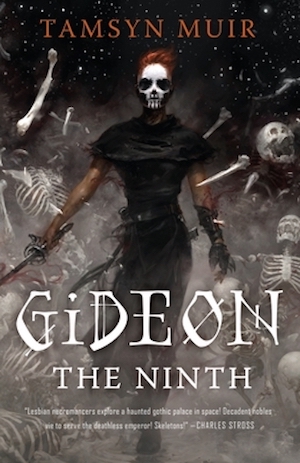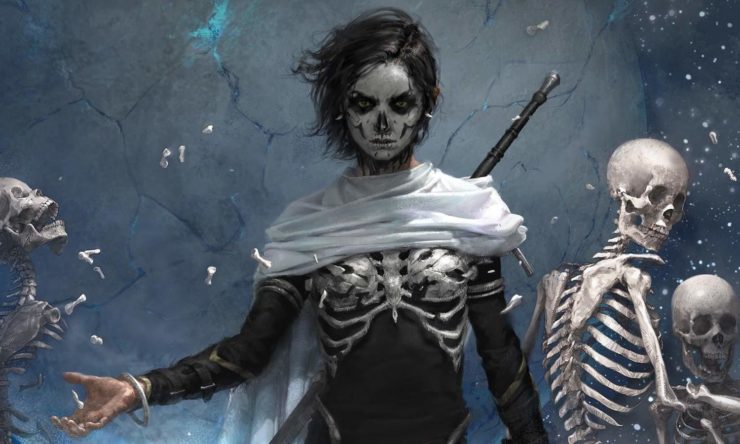I first read Gideon the Ninth in the summer of 2020, maybe a month after my dad had died suddenly and also, of course, in the middle of a deadly global pandemic. In that moment, I wasn’t actively seeking out material that reflected that part of my lived experience. Mostly, I saw “lesbians” “swords” and “memes” and thought “yes please!” Quickly, the books captured my heart and imagination. But not until later, reading, “As Yet Unsent: Cohort Intelligence Files” the bonus chapter released with the paperback edition of sequel, Harrow the Ninth, that I began to think of the series as an evolving inquiry into the nature of death and dying, what it means to be left behind. And speaking from experience, one thing is absolutely clear: Tamsyn Muir understood the fucking assignment.
Since then, I’ve bought and shelved and sworn to read so many books about death. Critically acclaimed books! Books with great reviews! Not a one has actually made it to the top of the stack. I’m not avoiding them because I worry that I won’t be able to handle reading about death. I just worry none of these books will do it justice. Losing someone, especially when you’re young and it seems like everyone else is carrying on happily with all their loved ones, or maybe just down a grandparent or two, will make you feel like a tragic hero. I felt (feel?) so special in the worst kind of way. What could Joan Didion have to say that I don’t already know?
[Spoilers for Gideon the Ninth and Harrow the Ninth]
In Harrow the Ninth, we see death as heart-rending, unstoppable, something to be warred with. Grief in Harrow is big and uncontrollable and totally extreme. In reality, too, it’s all those things. When Harrow wakes up with Gideon gone, the mere presence of Gideon’s sword causes repeated projectile vomiting. Related to necromantic brain-meddling or not, the pure magnitude of it is symbolically perfect.
Lest we forget, altering the structure of your brain to forget someone entirely so they won’t really die is, well, seriously unhinged. But it feels right. Don’t ask me how I know this, but you might consider yourself a perfectly reasonable person just walking down a sleepy residential street and then find yourself trading shouted invectives with a stranger and her teenager for, oh, riding their bikes on the sidewalk. After about a block of this the woman might tell you that you seem like an unhappy person to which you might shout (and I’m just theorizing here), “Yeah! I am! My dad just died!” Because that’ll show her, right?
Buy the Book


Gideon the Ninth
Among the many things that Muir gets so right is the irrevocable wrongness of loss, the fact that you are here and they are not. It’s an ugly feeling, something the mind takes a very long time to wrap itself around. I think this is one of the reasons people love these books as much as they do. Emotions that extreme are incredibly attractive, I think, in large part because most of us wish we could feel that intensely. I know I do.
What Camilla Hect and I understand is that we do not begin to understand each other’s grief. She does not mince her words. (Page 535)
“As Yet Unsent” takes us to a Blood of Eden camp where Camilla, Coronabeth, and Captain Deuteros are being held captive after the events of book one. The chapter is a report written by the latter, accounting the details of the trio’s captivity and BOE’s actions as well as she can. Some key parts of the canon are revealed, seeds planted for the next books, and hints dropped about what’s to come. I won’t get into speculation about those, there’s far too much to be contained here. But it struck me, after trying to convey to a friend how the chapter had made me feel—I ended up texting the emoji with huge, watering eyes—that Tamsyn Muir continues to write into the complexity of death.
Deuteros, who, in the aftermath of the events of Gideon, has endured great loss and tremendous personal injury, reports just the facts. When she strays toward the emotional, the nostalgic, she looks only at a distance. She tells Camilla, in concise and declarative bits how her devotion to her cavalier, Marta Dyas, almost grew to be too much for her to handle. She’s businesslike. It’s a warning, not a soliloquy after all. But the speech absolutely smacks of love.
Many of my cavalier’s habits are becoming the work of recollection; others are indelible. (Page 530)
Dyas comes up often, as if Deuteros is reminded of her at every turn: She liked to play chess; she could run a kilometer in five minutes. It’s ironic that when someone is dead, they are often more present than ever. So, this is how you learn how to talk about someone who’s gone. People will wait for the other shoe to drop, for you to be overcome—something a little more predictably dramatic than just these flashes of recollection, remembering at a remove.
One of the moments of the story that sticks with me most is the very end.
(Spoilers follow…)
Camilla, Coronabeth, and Deuteros regard Gideon’s dead but pristine body with fascination. Deuteros writes,
I attended the funerals of Cohort soldiers younger than myself. I never found them poignant.
When the princess and I looked down at her face, clean of her House’s ritual cosmetics, I envied the dead cavalier her incorruptibility. The princess reached over to touch one dead cheek, whimsically smooth the red hair. I didn’t envy the dead cavalier that.
The princess said to me, I have her rapier, you know. I picked it up that day I went to find you; I found it in the skeleton rubble. The Cell Commander says to keep it locked up, but I’ve got it. I didn’t want them to throw it out.
When I told her that even a dead cavalier still had rights to their sword, she said, Oh, I don’t think she’d mind. The Ninth was sweet. She was never anything but nice to me. Then the princess said unnecessarily, She was yummy, too. Fantastic body. Makes a beautiful corpse. Don’t you think she looks just like a body in a picture book?
I said, She looks like someone who died fighting. (Page 550)
The three, who have all lost so much, aren’t overwrought or in disbelief. They grieve, yes, but by way of observation. Loss like that will give you a perspective on death that is precisely this quiet and calm.
In an ER waiting room I was almost certainly not supposed to be in, COVID restrictions still very much a thing, I sat waiting after heading to the hospital with my dad. That, and the late hour meant it was just us and the nurses alone. After what felt like years, a nurse came back to the desk from the ER itself, her scrubs soaked in sweat. “Yeah,” she said to her coworkers, “I think I’m gonna have to go take a shower.” I knew, because there were few other obvious reasons, that she’d worked up this sweat doing CPR on my dad. The observation itself wasn’t traumatic—I’d never thought about how physical a nurse’s job could be—but the realization that the worst day of your life might just be an intense 45 minutes of someone else’s busy hospital shift inspires a kind of quiet wonder in me still.
To stand over a dead body that hasn’t decomposed, to envy it, to call her yummy is the Locked Tomb version of what it feels like to look at your life and know just how much it is changing forever. There are one billion things I could say about grief, none terribly profound and mostly things that someone else has already said. What I think people underestimate is just how tiresome grief is, how boring it makes the rest of the world, how much it makes you just want to be quiet. When the worst thing has already happened to you, it can be very hard to feel upset about anything else.
Most days now, I can carry on without my tremendous loss taking up most of my brain space. I think I’d shut down if I didn’t learn to walk with it. But some days, if I’m not careful, I do catch myself standing on the edge of what feels like a massive crater and looking down. If I didn’t look at the world askance, I’d certainly fall in.
It sometimes feels like the whole rest of the world (literally all of it) doesn’t know what to say to you when you lose someone. Few things have been said to me in those moments that I truly needed to hear, or at a minimum, benefited from hearing. None of the things reflected how wrong it is to lose someone, especially when you’re young, how absurd, how messy, how unbelievable, and, honestly, how funny.
Maybe that’s why it’s so important to me that writing about death be both precise and expansive. Maybe because loss is one of the quickest ways to feel completely inexplicable. Shortly after my dad died, a friend kindly asked me if I wanted to talk about it, or if I was going to see a therapist. I only responded, “I don’t have anything left to say.”
When you are grieving, everybody wants words from you. Mostly they ask, “How are you?” which is a terribly difficult question to answer under the best of circumstances. Very often, words are the last thing I have. The fact that someone else is writing them with such aplomb, wit, care, and nuance is a balm for those of us who have long since run out of things to say.
Slowly and (mostly) quietly, Tamsyn Muir is making contributions to a canon of literature about death. She’s doing it in ways that subvert expectations about what it should mean to grieve, what that looks like, and who gets to do it. The Locked Tomb books have spoken to legions of people looking for a fresher lens on a world that can be pretty hard to conceptualize. “As Yet Unsent” is the next addition to a body of work that’s doing a damned good job of filtering that world into something that feels familiar and graspable—a container you can hold in your own two hands.
Emma Leff (she/her) is an avid reader of SFF as well as an arts-education administrator, theatre artist, and haver of niche hobbies. She hails from Chicago, IL and holds a B.A. from Hampshire College in youth studies and theatre. Currently, she’s working on an academic journal article about youth artists and the adults who support them. It will be finished eventually. When not reading or working to provide young people with transformative arts experiences, Emma can be found riding her bike excessively or making her own clothes. You can find her on Twitter.










